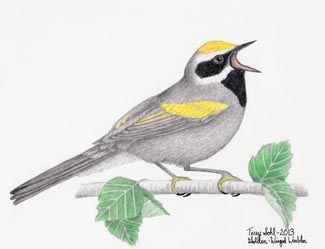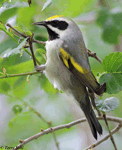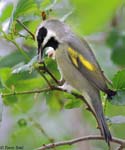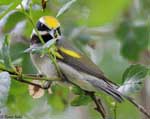| Length: 4.75 inches | Wingspan: 8 inches | Seasonality: Migrant |
| ID Keys: Yellow cap and wing patch, black throat and facial mask | ||
 Golden-winged Warblers are
a beautiful, uniquely patterned warbler species that breeds in the
Midwestern US, the Great Lakes region, and parts of Appalachia. Their
breeding range is quite small, and unfortunately, is in an area that
their close relatives, the Blue-winged
Warbler,
have been expanding their range into. Golden-winged Warblers and
Blue-winged Warblers will readily interbreed, a threat to genetically
pure Golden-winged Warblers. While a variety of intergrades between the
two species may result, most often cross-breeding results in a
"Lawrence's Warbler", that looks like a Golden-winged Warbler but with a
yellow body, or a "Brewster's Warbler" that looks like a Blue-winged
Warbler with additional white markings. Hybrid birds may sing the songs
of either parent, or even more rarely, may sing both songs!
Golden-winged Warblers are
a beautiful, uniquely patterned warbler species that breeds in the
Midwestern US, the Great Lakes region, and parts of Appalachia. Their
breeding range is quite small, and unfortunately, is in an area that
their close relatives, the Blue-winged
Warbler,
have been expanding their range into. Golden-winged Warblers and
Blue-winged Warblers will readily interbreed, a threat to genetically
pure Golden-winged Warblers. While a variety of intergrades between the
two species may result, most often cross-breeding results in a
"Lawrence's Warbler", that looks like a Golden-winged Warbler but with a
yellow body, or a "Brewster's Warbler" that looks like a Blue-winged
Warbler with additional white markings. Hybrid birds may sing the songs
of either parent, or even more rarely, may sing both songs!
Habitat change may also be contributing to declines in Golden-winged Warblers. They prefer to nest in wet, shrubby areas, but young birds prefer to move to nearby forested areas once leaving the protection of their parents. Ironically, Golden-winged Warblers were proliferating during the early part of the 20th century, as widespread forest cutting in the Eastern US had led to a substantial increase in the mixed habitats they prefer, with intact forest areas adjacent to cleared forest and shrubby lands. However, as eastern forests have regrown, that mixed habitat has declined.
Habitat:
In South Dakota during migration, Golden-winged Warblers are generally found in deciduous forest areas, where they may be found with other migrating warbler and songbird species. On their breeding grounds, they seem to have specific habitat needs that include wet, boggy, shrubby areas for nesting, with forested areas nearby.
Diet:
Primarily insects.
Behavior:
Moves through foliage and gleans insects from leaves and twigs. Primarily forages high in the treetops during the summer months, but can be found lower in the canopy during migration and in winter.
Breeding:
Non-breeder in South Dakota. On their breeding grounds, Golden-winged Warblers select a protected area on the ground, typically in herbaceous vegetation along the edge of a forest clearing, in secondary forest, or in shrubby areas with scattered trees. The nest is a cup, placed at the base of a small shrub or clump of herbaceous vegetation, and constructed on a base of leaves with a smaller cup of grasses, leaves, and other vegetative material. The female lays between 3 and 7 eggs, and she alone incubates them. The young hatch after about 11-12 days, and fledge from the nest about 10 days after hatching.
Song:
Golden-winged Warblers have a two-part song with a buzzy, higher-pitched first note, followed by several shorter, lower-pitched notes. They also have a more complex alternative song, with the same buzzy notes. The call of a Golden-winged Warbler is a perfunctory tseep.
- Click here to hear the song of a Golden-winged Warbler1
- Click here to hear an alternative song of a Golden-winged Warbler2
- Click here to hear the short contact call of a Golden-winged Warbler3
Migration:
Summers in a relatively narrow area around the Great Lakes and through the Appalachians. Winters in Central and South America.
Interactive eBird map:
Click here to access an interactive eBird map of Golden-winged Warbler sightings
Similar Species:
Quite distinctive, although hybrid Golden-winged/Blue-winged Warblers can be very confusing.
Conservation Status:
Golden-winged Warblers are in serious declines throughout much of it's range. Golden-winged Warblers are losing ground to competition with Blue-winged Warblers and Brown-headed Cowbird parasitism. Both threats are potentially linked to changes in habitat, as forest cutting and fragmentation results in more "edge" habitat, habitat that's favorable for Blue-winged Warblers, and habitat that also increases vulnerability to cowbird access. Systematic surveys have shown dramatic declines in populations over the last several decades, with even more pronounced declines in recent years. Because of the ongoing threats to the species, the IUCN considers the Golden-winged Warbler to be a species that is "Near-threatened".
Further Information:
- New York Department of Environmental Conservation - Golden-winged Warbler
- WhatBird - Golden-winged Warbler
- Audubon Guide - Golden-winged Warbler
Image Information:
Colored pencil drawing by Terry Sohl - 2013
Audio File Credits:
- 1Nick Kiehl. Recorded in Marion County, Indiana on May 7th, 2018. Original recording and information available from xeno-canto.
- 2Andrew Spencer. Recorded in St. Louis County, Minnesota on June 6th, 2012. Original recording and information available from xeno-canto.
| Click on the map below for a higher-resolution view |
 |
| South Dakota Status: Rare migrant, especially in the extreme eastern part of the state. |
Additional Golden-winged Warbler Images
Click for a higher-resolution version of these images




